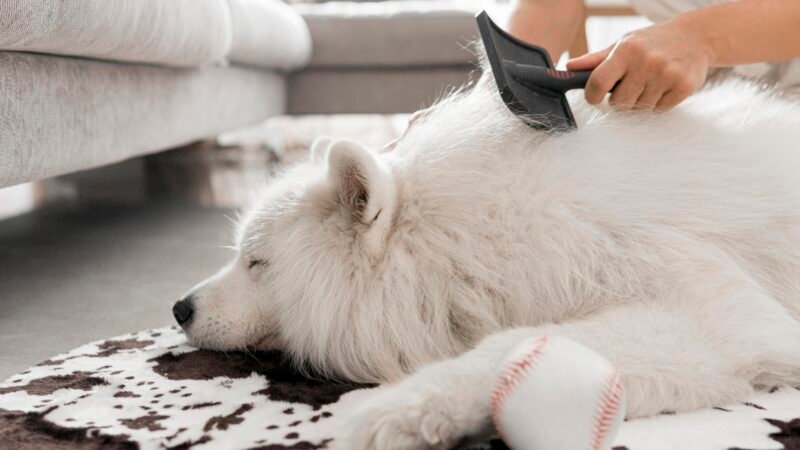How Grooming Boosts Dog Skin and Coat Health
The Ultimate Guide to Prevent Shedding and Skin Problems

Grooming and Nutrition: The Keys to Healthy Dog Skin and a Shiny Coat
Keeping your dog’s skin and coat healthy isn’t just about looking good—it’s a vital step in preventing skin diseases, excessive shedding, and painful matting. While proper grooming helps with surface hygiene, long-term coat health depends heavily on what goes into your dog’s bowl. In this guide, we’ll explore how grooming and diet work together to promote your dog’s skin and coat health, with tailored tips for different breeds.
Why Grooming Is Essential for Skin and Coat Health
Regular grooming helps remove dirt, dead hair, and parasites that can cause skin irritation or infections. For long-haired and curly-haired breeds like Poodles, Schnauzers, and Border Collies, proper brushing prevents painful tangles and mats, which can trap moisture and bacteria against the skin.
Grooming also stimulates blood circulation, encouraging healthy hair growth. More importantly, it gives you a chance to spot early signs of skin problems—such as redness, bald patches, or inflammation—so you can act quickly before they worsen.
How Diet Influences Coat Quality (with Breed-Specific Examples)
Your dog’s coat is made primarily of keratin—a protein that requires sufficient nutrients to maintain strength, shine, and resilience. Here’s how essential nutrients and breed-specific dietary needs impact coat health:
Protein: The foundation of healthy fur. A protein-deficient diet leads to breakage and excessive shedding. Choose dog foods rich in quality meat sources like chicken, lamb, or salmon.
Omega-3 and Omega-6 Fatty Acids: These support moisture retention and reduce itchiness. Omega-3 (from fish oil and flaxseed) gives coats a soft, glossy look, while Omega-6 (from plant oils like sunflower) supports skin barrier function.
Golden Retrievers: Thrive on high-protein formulas with Omega-3s to prevent dullness and promote a smooth, flowing coat.
Bichon Frises: Benefit from Omega-6-rich diets combined with Vitamin A to support their dense, curly fur texture.
Vitamin E & Zinc: Vital for repairing skin and supporting follicle health.
Poodles: Often require hypoallergenic diets with Vitamin E to reduce inflammation and support their sensitive, curly coat.
Huskies: With dense double coats, they benefit from B-vitamins and zinc to reduce seasonal shedding and promote hair renewal.
Hydration: Adequate water intake supports skin elasticity and reduces flaking.
Labradors: Naturally oily coats need low-fat, antioxidant-rich food to prevent greasy buildup and skin irritation.
Choosing premium dog food with balanced protein, fats, and trace minerals is critical. For dogs with specific needs, veterinarian-approved supplements like fish oil capsules or multivitamins may also improve coat condition.
Recommended Grooming Products by Function (No Specific Brands)
To complement diet and maintain a vibrant coat, consider these grooming product types:
Moisturizing Coat Sprays: Look for sprays with natural ingredients like coconut oil, oatmeal, or aloe vera. These soothe dry skin and smooth out frizzy hair while providing a protective layer.
Omega-Rich Oils: Oral or topical oils like fish oil or flaxseed oil can improve skin barrier function, reduce inflammation, and encourage healthy fur growth. Use under vet guidance for best results.
Low-Allergen Grooming Products: For sensitive breeds, opt for fragrance-free, alcohol-free shampoos and conditioners. These reduce the risk of allergic reactions and maintain the skin’s natural balance.
Conclusion
A healthy, shiny coat is the result of consistent grooming combined with targeted nutrition. By understanding your dog’s unique needs and selecting grooming routines and diets accordingly, you can dramatically reduce shedding, prevent skin problems, and ensure your furry friend looks and feels their best year-round.
